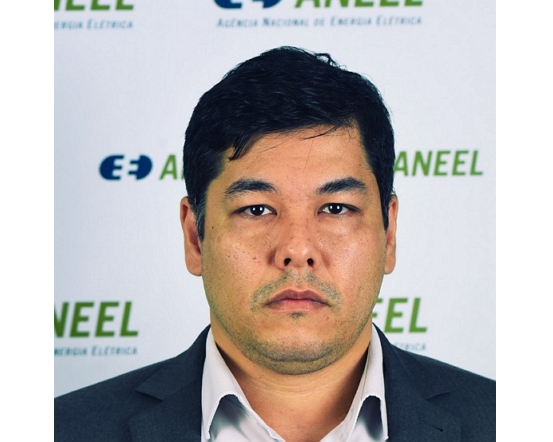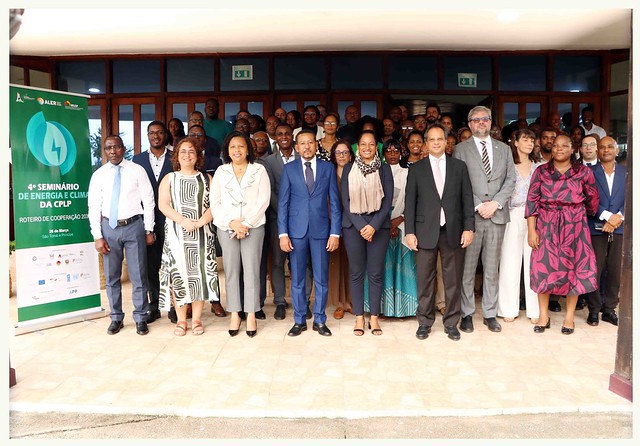2nd CPLP Energy and Climate Seminar Brought Together Governments and Funders in Cape Verde for Discussions on Energy Transition and Climate Funds
The 2nd CPLP Energy and Climate Seminar convened yesterday (October 30), bringing together governments and funders to discuss climate financing and energy transition in the Member States of the Community of Portuguese Language Countries (CPLP). Held at the Government Palace in Praia, Cape Verde, the event was organized by the Government of São Tomé and Príncipe, which currently holds the CPLP presidency, along with the CPLP Energy Thematic Commission of Advisory Observers, coordinated by the Lusophone Renewable Energy Association (ALER) and the Association of Energy Regulators of Portuguese-Speaking Countries (RELOP).
During the opening session, Mayra Pereira, President of ALER, emphasized the importance of CPLP countries participating actively and cohesively in discussions on climate and sustainability. “It is essential to present ourselves in a unified and informed manner, highlighting our specificities, challenges, and achievements while contributing with proposals that reflect our communities’ realities,” she said. Pereira stressed that “climate challenges demand not only awareness but also adequate funding for the implementation of effective solutions.” She underlined the importance of identifying funding sources to support innovative renewable energy and sustainability projects, which requires cooperation among CPLP countries.
Artur Trindade, Executive Secretary of RELOP, highlighted the value of cooperation in energy and climate within CPLP, given the significant experiences in various energy sectors. He noted that energy transition requires political and regulatory initiatives, civil society engagement, and strategic funding. “We cannot change today’s energy paradigm without addressing the issue of financing,” said Trindade. He emphasized the importance of knowledge exchange, experiences, and coordination to strengthen negotiation, debate, and dialogue.
Aurélio Martins, São Tomé and Príncipe’s Ambassador to Cape Verde, discussed the role of national banks in financing energy transition (through green certificates) and highlighted strategies for mobilizing climate funds, such as the Green Climate Fund and bilateral debt conversion agreements, including the one between Portugal and Cape Verde. He also stressed the importance of COP29 in defining a new collective quantified target for climate financing, expressing hope that it would channel more support to CPLP countries, aiding mitigation and adaptation efforts. Martins reaffirmed São Tomé and Príncipe’s commitment to an inclusive, fair, and effective energy transition.
The seminar also featured Alexandre Monteiro, Cape Verde’s Minister of Industry, Trade, and Energy, who outlined the country’s progress on climate issues, including ratifying the Paris Agreement, adopting the Nationally Determined Contributions (NDCs), and implementing a medium- and long-term energy transition strategy as outlined in the Electric Sector Master Plan 2018–2040. Monteiro emphasized the importance of international cooperation, both multilateral and bilateral, as well as partnerships with private investors, citing the partnership with Portugal for debt conversion into climate and environmental financing.
The event was marked by significant international participation, with representatives from various CPLP Member States contributing to different panels. Notable participants included Leandro Albuquerque from Brazil’s Ministry of Mines and Energy; Paula Panguene from Mozambique’s Ministry of Land and Environment; Carlos Monteiro from Cape Verde’s Ministry of Industry, Trade, and Energy; Damião Namuera from Mozambique’s Ministry of Mineral Resources and Energy; Gabriel Maquengo from São Tomé and Príncipe’s Ministry of Infrastructure and Natural Resources; Marco Rebelo from Portugal’s Environmental Fund; Alexandre Rodrigues from Cape Verde’s Ministry of Agriculture and Environment; Felisberto Mateus from the African Development Bank’s Lusophone Compact; Gilson Pina from Cape Verde’s Ministry of Finance; and Cecília Silva Bernardo from Angola’s Ministry of Environment.
This second seminar was supported by the German Agency for International Cooperation (GIZ) and GET.transform (funded by the European Union and German Cooperation). It was organized in partnership with Cape Verde’s Multisectoral Economic Regulation Agency (ARME) and sponsored by ANPG (National Agency for Petroleum, Gas, and Biofuels), ALSF (African Legal Support Facility), Miranda Alliance, Sonagás Renewable Energies, and APP (Águas de Ponta Preta).
This seminar is the second in the CPLP Energy and Climate Seminar Series aimed at fostering the exchange of experiences and best practices among CPLP countries in the context of energy transition, as well as promoting public-private complementarity in financial resources for sustainable energy projects.
The third seminar, scheduled for November 4, 2024, will take place at the Institute of Economics of the Federal University of Rio de Janeiro (UFRJ) in Rio de Janeiro, Brazil. It will focus primarily on advances in the regulation of national carbon markets. The event will include a preview of COP29 and COP30, a roundtable discussion on carbon market regulations in CPLP countries, and presentations of carbon credit financing mechanisms and case studies in the energy sector from Angola, Brazil, Cape Verde, Mozambique, and Portugal.
The fourth and final seminar in this series, set for March 2025 in São Tomé and Príncipe, aims to launch the “Lusophone Roadmap for Energy Transition to COP30.” This document will compile the energy transition strategies and climate financing plans of each CPLP country and identify areas for cooperation among them.
The CPLP Energy and Climate Seminar Series has institutional support from the CPLP, the Ministry of Infrastructure and Natural Resources of São Tomé and Príncipe, the Ministry of Energy and Water of Angola, the Ministry of Mines and Energy of Brazil, the Ministry of Industry, Trade, and Energy of Cape Verde, the Ministry of Energy of Guinea-Bissau, the Ministry of Mineral Resources and Energy of Mozambique, and the Ministry of Environment and Energy of Portugal.
















